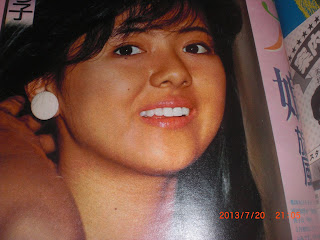That adorable sweetness compelled me to take on one of her classics, the heartwarming "Genki wo Dashite"(Cheer Up). I was surprised to find out that it had never been released as an official single, but as the first track on Yakushimaru's first official album "Kokinshu"(古今集....an abbreviation for The Collection of Poems of Ancient and Modern Times [yikes]), released in February 1984. The album hit No. 1 on Oricon and ended up as the 12th-ranked album of the year. I've got the audiotape of it somewhere in the crevices of my apartment.
In any case, I hadn't heard Hiroko's version in several years so listening to it again tonight caught me off guard since I was accustomed to Mariya Takeuchi's(竹内まりや)"unplugged"version for so long. The original version had the 80s aidoru tropes of cute jingly synths and strings, but the ballad still sounded lusher than the usual aidoru tune, in my estimation anyways. And Hiroko's high and sweet vocals made this song of encouragement into a message of sorts from a junior high school student to a classmate or even to one of her parents.
So, it was pretty revealing when I took a look at the writeup of the song on J-Wiki and read the inspiration behind "Genki wo Dashite". Takeuchi found out about the breakup of the marriage between James Taylor and Carly Simon back in 1983, and when she saw the pained expression on Simon's face somewhere in the media, she decided to create this song. Apparently, her husband and the arranger for the song, Tatsuro Yamashita(山下達郎), also had James Taylor in mind when he took on those chores.
For me, I think I'll always be partial to the recorded version by Takeuchi. Her vocals and the arrangement with the guitar, the piano and that thrilling organ are so warm that the song can pretty much cheer up anyone of any age. It just has that security blanket feeling. Yamashita is in there with the backing vocals, but the icing on the cake is Yakushimaru making her vocal cameo at the very end. I could imagine that depending on the situation, those final bars could get a few listeners a bit emotional.
Takeuchi's self-cover first appeared as a B-side for her 15th single, "Yume no Tsuzuki"(夢の続き...The Dream Continues) from July 1987, but it got promoted to A-side status as her 17th single in November 1988. Unfortunately, for some reason, it got no higher than 70th place on the Oricon weeklies so it wasn't deemed all that successful (a little too sentimental, perhaps?), but it is still a favourite among her fans. The song was also in her 7th album, "Request" which came out in August 1987.
Hitomi Shimatani(島谷ひとみ)just struck me with this image of a young tall beauty (although she's only 161 cm) who could dance and sing when she first appeared on the telly at the turn of the century. So, it was a revelation when I heard that she had started her career as a budding enka singer in 1999. But her first two singles in that genre didn't make much of a dent, so she went into a more pop direction. For me, whenever I think of her, two singles come to mind: "Papillon", her 3rd single of February 2001 (a cover of Janet Jackson's "Doesn't Really Matter"), and her most successful hit, "Amairo no Kami no Otome"(亜麻色の髪の乙女...The Girl With The Flaxen Hair) from 2002, itself a cover of the single by the Group Sounds band, Village Singers.
Shimatani also had further success with her own more sprightly cover of "Genki wo Dashite", which was released as her 11th single in June 2003. It got as high as No. 10 on Oricon and got her a second appearance on the Kohaku Utagassen. Her version was also on her 3rd album, "GATE - Scena III" which came out in August 2003 and peaked at No. 2.
Of course, Shimatani joins a number of singers who have covered "Genki wo Dashite" over the decades.
 |
| Hiroko Yakushimaru |
No comments:
Post a Comment
Feel free to provide any comments (pro or con). Just be civil about it.